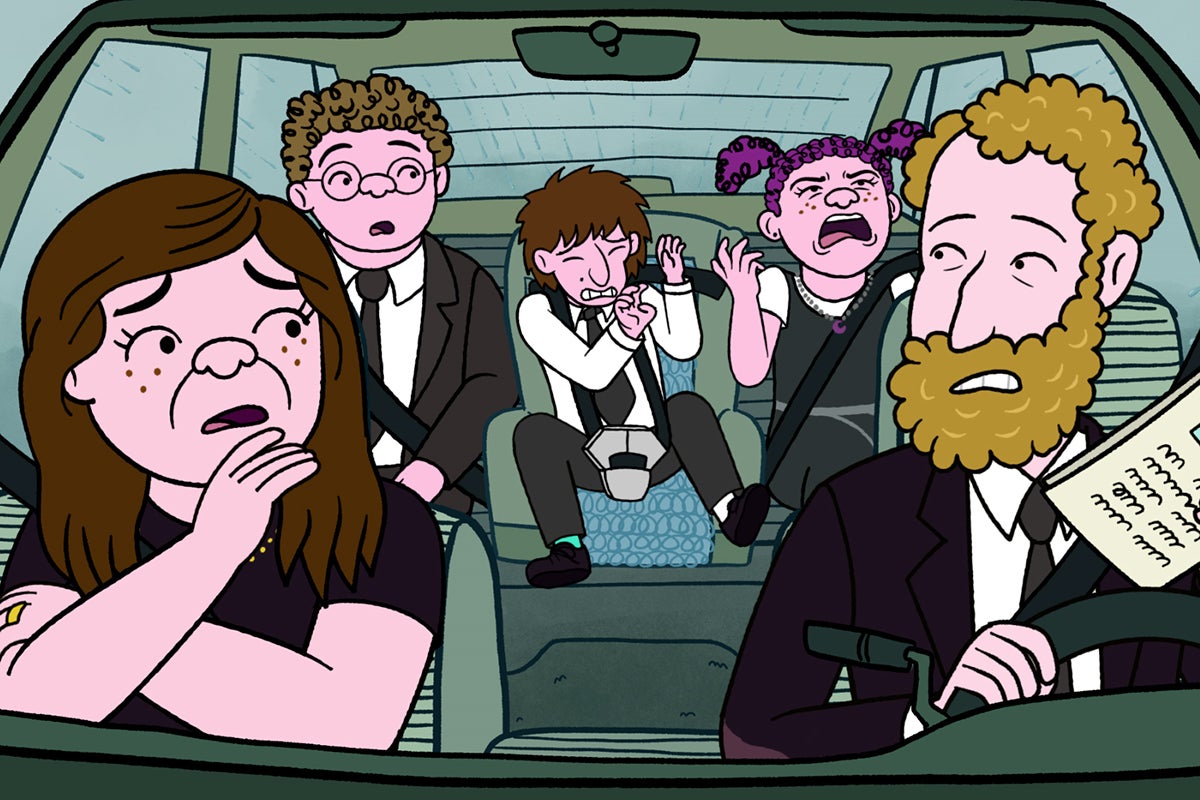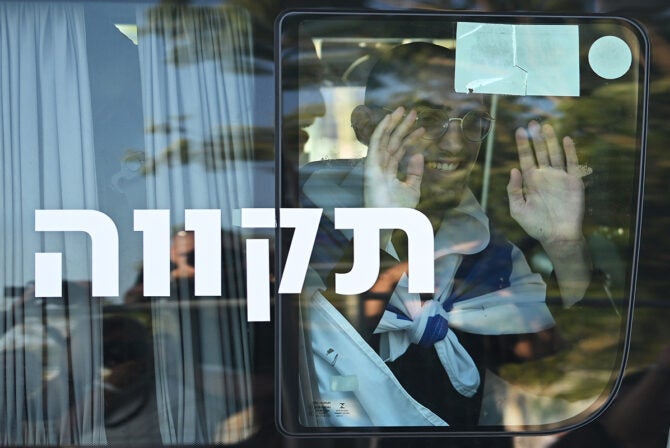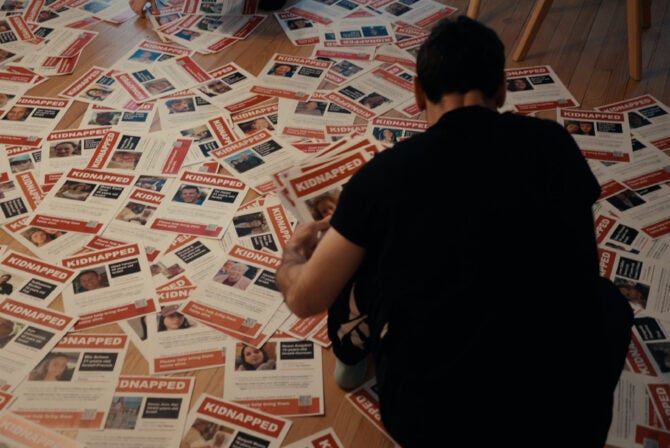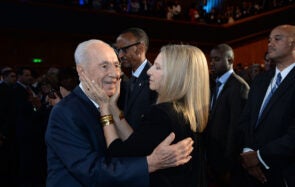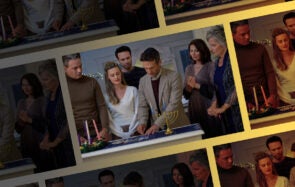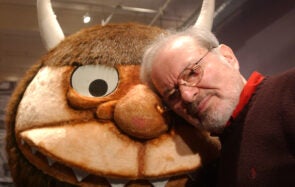I’ve made it no secret that “Long Story Short,” the new animated series from Raphael Bob-Waksberg (the creator of “BoJack Horseman”) about the very Jewish Schwooper family, was perhaps the show I was most looking forward to this year.
And having binged the entire first season — in which the story of these five family members unfolds, moving back and forth through the years and the decades, through the height of the 2020s COVID-19 social distancing and peak ’90s grungy youth, to the loud familial din of 1959 Jewish New York, through bar mitzvahs, proms under the shadows of 9/11, JCC galas and last minute Rosh Hashanah shopping — in record time, I can now say with certainty: It is pure unbridled Jewish magic.
And yet watching its first episode, I felt a very familiar sense of trepidation set in.
I’m so sensitive to the stereotype of the overbearing Jewish mother: the one who ruins her childrens’ lives, who never thinks anything they do is good enough, the kind who puts image and tradition ahead of the thoughts and feelings of her progeny, you know the one! And Naomi Schwartz, the Jewish matriarch of the Schwooper family (a portmanteau of Schwartz and Cooper), had all my alarm bells dinging.
Schwartz is voiced by one of my favorite Jewish actresses, Lisa Edelstein (of “House” Dr. Cuddy fame). We first meet her on the way to her mother’s funeral. Her three young children, Avi (Ben Feldman), Shira (Abbi Jacobson) and youngest Yoshi (Max Greenfield), are bickering in the backseat (“Yoshi is pinching me, must I suffer in silence,” Shira complains to her parents, likely echoing her own mother), and her husband, Elliot Hooper (Paul Reiser) is fumbling with directions, so her kvetching about the rabbi’s sermon and being lost and orphaned in that traditional New York Jewish accent could be excused.
But later in that first episode, the barrage continues. It’s 2004, and Naomi is preparing for Yoshi’s bar mitzvah. Avi is in town with his new (non-Jewish) girlfriend, Jen (Angelique Cabral). The Jewish matriarch still manages to wrap herself around her children like an anaconda; even her showering Avi with affection feels stifling. “I love you, I love you, I love you, now say it back,” she says, her trademark greeting for her children. Yikes.
She also smothers with constant judgement and kvetching. While she kvells about Jen being an actress, she keeps asking her how she’s going to make a living. She complains about Jen’s heavy bags. And when Jen gives her a gift — a vase — she can’t help but bring up over and over how bringing an empty vase really isn’t a gift. She also keeps calling her “Jennifer.”
The show continues with more of these kinds of moments in which Naomi takes all the air out of the room, and at times, her children’s sails. Even though Elliot can be equally kvetchy and nitpicky, it’s Naomi — her judgement, her voice — that seems to loom the largest in her children’s heads.
At one point, when one of the children chooses a different path in their relationship to Judaism, Naomi even says the quiet part out loud: “A progressive egalitarian Conservative Judaism with an emphasis on ritual and community over faith and blind practice — that’s literally the only way it makes sense!” It’s a funny line; it also shows us that in Naomi’s head — as in the heads of all stereotypical Jewish mothers? — there is one right way to be a Jew.
And yet as I continued to watch the show, the ringing in my ears gentled. Naomi might embody many Jewish mother stereotypes — but she is also so much more.
“Long Story Short” is meticulously made and above all else, is about the essence of family. Each innocuous line of dialogue is used to its maximum potential; every seemingly benign element — a joke about Mad Libs, a fight about express checkout — comes back to breathe more meaning and fill in layers about the shows protagonists and their relationships.
So too, is the case with Naomi. As the show moves back and forth through time, we get to know Naomi, and her children, ever so intimately. We see her as a fuller person — yes, we get judgement and complaining, but we get desperate love, and we see how that love — not just her judgement — has shaped them.
What makes “Long Story Short” such an accomplished show is its attention to detail, both in the art, which is loose and alive and vibrant and also in the writing. We don’t just get challah and brisket, we get tichel and broccoli kugel, we get hechshers and fleishik sponges and the life-changing words of the Yom Kippur Ashamnu prayer — it’s those very multifaceted Jewish details that make the show universal.
And that multifaceted approach is what makes Naomi so special. She is not just the old stereotype of a Jewish mother; she is complex and human, and in spite of her flaws, she truly loves her children. Many people watching from all backgrounds, I’m sure, will see something familiar and touching in her character, especially those of us raised by boomer parents who tried their best and perhaps didn’t have exactly the tools we needed, or the exact right words to share their love with us.
In that first episode, the Jewish philosophy behind the show is laid bare as they ride in the car and Avi muses about his grandmother meeting her loved ones in the afterlife. There is no after life, Naomi says, and Elliot simply says that as Jews, “we focus on this life, you live a good meaningful life so you live a good meaningful life.”
“Is that it? You think Jews could have negotiated a better deal!” Avi says, and despite her grief, you see Naomi’s fond smile in the mirror, marveling at her son. It’s a beautiful little moment of a Jewish mother’s love.
